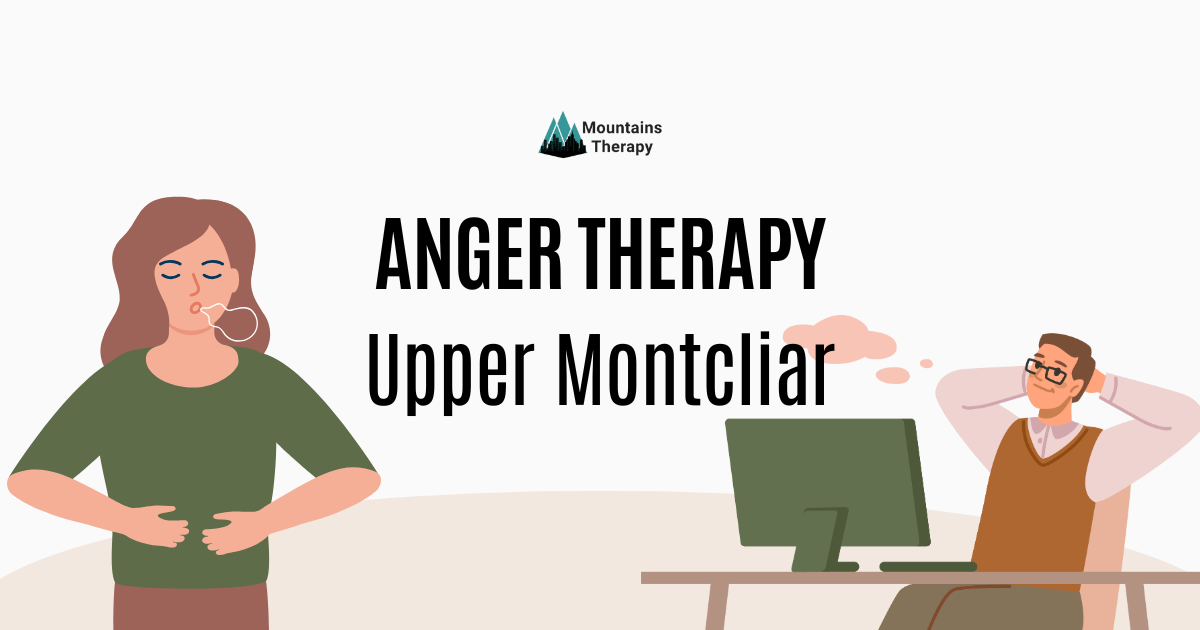Anger Therapist in Montclair, NJ: How Therapy Can Help You Take Control of Anger
Learn more about Anger Therapy in NJ.
In This Blog, You’ll Learn:
- What an anger therapist is and how they can help you.
- The most effective therapies for managing anger.
- How to recognize when it’s time to seek therapy for anger issues.
- The difference between CBT, DBT, and other therapy approaches for anger management.
- Practical coping strategies you can start using right away.
- What to expect in anger management sessions and how long therapy usually takes.
- Answers to common questions like "What mental illness causes rage outbursts?" and "Can a person with anger issues change?"
Understanding Anger and When to Seek Help
Anger is a normal human emotion but when it becomes overwhelming, frequent, or explosive, it can harm your health, relationships, and overall well-being. If you find yourself wondering "How to deal with extreme anger?" or asking "Can a therapist help me with anger issues?", the answer is yes. An anger therapist can help you understand your triggers, develop coping skills, and break free from patterns of rage and resentment.
At Mountains Therapy in Montclair, NJ, we provide compassionate, evidence-based therapy to help clients of all ages (6 and up) gain control over anger. Whether you’ve been told you have an anger problem, struggle with severe anger, or are simply looking to improve your emotional regulation, therapy can help you change your life.
What Is an Anger Therapist?
An anger therapist is a licensed mental health professional who specializes in helping clients identify the underlying causes of anger, learn healthy expression, and develop long-term coping strategies. Sessions often focus on uncovering the emotions behind anger — such as hurt, fear, or frustration — and replacing destructive reactions with constructive responses.
What Therapy Is Best for Anger?
Many people ask, "What is the most effective therapy for anger?" The answer depends on your personal needs, but some of the most effective approaches include:
- Cognitive Behavioral Therapy - CBT for Anger — Helps identify and change thought patterns that lead to anger.
- Dialectical Behavior Therapy - DBT for Anger — Focuses on emotional regulation, distress tolerance, and mindfulness.
- Mindfulness-Based Therapy for Anger — Increases self-awareness and promotes calm responses to triggers.
- Psychodynamic Therapy for Anger— Explores past experiences and unresolved emotions that contribute to anger.
- Solution-Focused Therapy - SFT for Anger— Helps you set practical goals and make immediate changes.
If you’re wondering, "Is anger management CBT or DBT?", the truth is that both can be effective. CBT is often best for identifying and restructuring harmful thought patterns, while DBT is especially helpful for those with intense emotional swings.
Signs You May Need Anger Therapy
You might benefit from seeing an anger therapist if you experience:
- Frequent yelling, arguments, or aggressive behavior
- Physical outbursts, property damage, or threats
- Feeling on edge or irritated most of the time
- Trouble controlling your temper in relationships or at work
- Guilt, shame, or regret after losing your temper
- Physical symptoms like rapid heartbeat or headaches when angry
If you’ve been wondering, "Who should I see if I have anger issues?" or "When to see a therapist for anger?", it’s best to seek help when anger begins interfering with your daily life, relationships, or mental health.
Myths vs. Facts About Anger Therapy
Myth: Anger is bad and should be avoided.
Fact: Anger is a normal emotion, but it must be expressed in healthy ways.
Myth: Anger management means suppressing anger.
Fact: Suppressing anger can be harmful, the goal is to understand and redirect it.
Myth: People with anger issues can’t change.
Fact: With the right therapy, many people learn to manage and reduce their anger over time.
How Does Anger Therapy Work?
You may be asking, "How long does anger therapy take?" or "How do you deal with severe anger?". While timelines vary, most clients begin seeing improvements within weeks to months. Therapy involves:
- Identifying Triggers — Recognizing patterns, situations, and thoughts that lead to anger.
- Emotional Regulation Skills — Learning techniques to calm your mind and body.
- Cognitive Restructuring — Challenging and reframing unhelpful thoughts.
- Communication Skills — Expressing needs without aggression.
- Relapse Prevention — Building strategies to maintain progress long-term.
Therapy Approaches for Anger in Montclair, NJ at Mountains Therapy
At Mountains Therapy, we offer a variety of treatment modalities to address anger issues, including:
- ACT – Acceptance Commitment Therapy for Anger — Helps you accept emotions without letting them control your actions.
- Attachment-Based Therapy for Anger — Explores how early relationships shape emotional expression.
- CBT – Cognitive Behavioral Therapy for Anger — Replaces harmful thought patterns with healthier ones.
- DBT – Dialectical Behavioral Therapy for Anger — Builds skills for managing intense emotions.
- EFT – Emotionally Focused Therapy for Anger — Strengthens relationships through better emotional understanding.
- Mindfulness-Based Therapy for Anger — Encourages calm and present-focused awareness.
- Narrative Therapy for Anger — Helps you reframe your life story to create positive change.
- Psychodynamic Therapy for Anger — Addresses unresolved emotional issues.
- SFT – Solution Focused Therapy for Anger— Creates targeted action steps toward your goals.
- TF-CBT – Trauma Focused CBT for Anger — Addresses trauma-related anger.
FAQs About Anger Therapy
Q: Can a person with anger issues change?
Yes — with consistent therapy and practice, most people can significantly improve their anger management skills.
Q: What mental illness causes rage outbursts?
Conditions such as PTSD, bipolar disorder, borderline personality disorder, and intermittent explosive disorder can involve extreme anger.
Q: What is therapy for anger issues called?
It’s commonly referred to as anger management therapy.
Q: What’s the best therapy for anger issues?
CBT, DBT, and mindfulness-based approaches are widely considered the most effective.
Q: How long does therapy take for anger issues?
Many clients notice changes within 8–12 sessions, but long-term benefits come from ongoing practice.
You are not alone! Take First Step Toward Change
If you’ve been searching for "the best therapy for anger issues" or wondering "Can anger issues be fixed with therapy?", the answer is yes but change starts with reaching out. At Mountains Therapy in Montclair, NJ, we’ll help you address the root causes of your anger and equip you with tools for lasting emotional control.














